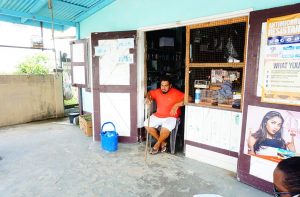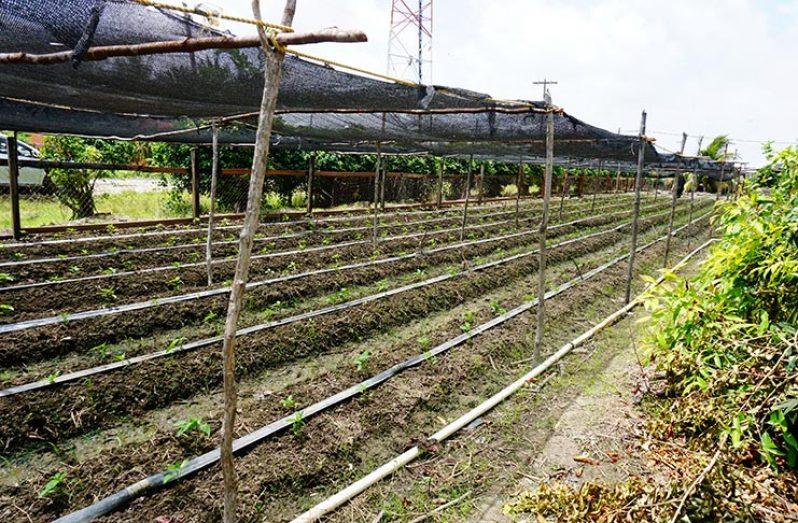By Michel Outridge
Amad Bacchus is a cash crop farmer, who has a cultivation of bell peppers and celery in his shade-house, located in his yard and a plot of vegetables aback the village.
He is a resident of Cotton Tree, West Coast Berbice and sells his produce to wholesalers.
Bacchus told the Pepperpot Magazine that Region Five (Mahaica-Berbice) is an agriculture-based area where the locals either work at the sugar estate or they are farmers.
He added that there are a few self-employed folk who make a living with their bus, a car or a small shop.
Bacchus pointed out that Cotton Tree and Bush Lot are the large villages compared to others such as Zee Zight, which has only three small streets with just about 200 residents.
He has been in the farming business for the past 19 years and is the father of three, who enjoys the quiet, country life that is punctuated with hard work.

“This place needs a boost, we can use some investments and job creation for the young people, who have nothing to do because some don’t want to be farmers,” he said.
As an agriculture-base village, Bacchus related that they need assistance in terms of infrastructure – access to water, irrigation, access to the backlands and farming produce relief.
He stated that as a cash crop farmer, he has suffered losses not just in marketing since they have no added value to his produce, all perishables and cannot wait for the better prices on the market.
Even though Cotton Tree farmers would have benefitted from the Rural Agricultural Infrastructure Development Project (RAID) which is facilitated by the government, the farming group has dissolved but is vibrant in other villages such as, Bath and Rosignol.
“We the farmers need better access to the farmlands aback the village and for enhanced productivity, in marketing, since it is flooded with produce especially for small scale cash crop farmers,” he said.
As a small scale farmer, Bacchus explained that his losses are a lot and they add up because crops take time to grow and the labour, cost of fertilisers and other things are considered.
For instance, he disclosed that tomatoes take two months to grow from seedling to reaping and when it is sold it is less than $50 per pound and there are no profits to record as a cash crop farmer.
Bacchus told the Pepperpot Magazine that cash crop farming is a high-risk investment with little or no returns with consideration of the weather, disease, pests and lack of rainfall.
“To grow perishables is a high risk one takes to go into the pocket for this venture and it is very challenging, to say the least, from production to the market, since you cannot bargain for a better price to wholesalers, who make the profit,” he said.
Bacchus has established a shade-house for his bell peppers at his home because they need regular attention being a delicate crop and has a plot of one and a half-acre of tomatoes and celery in the farmlands of the village.
He uses his motorcycle to get to his farmland since it is more convenient and easier and would spend most of the day tending to his crops.
His yard is one to envy since it has an abundance of fruit trees, plants, flowers and budding vegetables.
Zahir Pet Supplies

Zahir Khan owns a small pet shop and supplies store at Cotton Tree Village, the only such business along West Coast Berbice.
He opened that business seven years ago, when he had to travel to either the city or Corentyne to get supplies for his livestock, cattle and dogs.
Khan caters for farmers in his village no matter the time of day or night he would assist because he knows the hardships faced by farmers.
The father of three told the Pepperpot Magazine that he used to plant rice and cash crops but cut his losses and accepted a simpler way of life.
Today, he has a kitchen garden of fruits and vegetables and has sheep, horses, two German Shepherd dogs and birds.
“I have pet supplies for dogs, birds and medicines for cattle and livestock and animals because I know in this area how hard it is to source these things and I provide a service to the people,” he said.
Khan reported that in Cotton Tree, one cannot go hungry because everybody is planting something and they are very neighbourly and assist each other.



.jpg)









